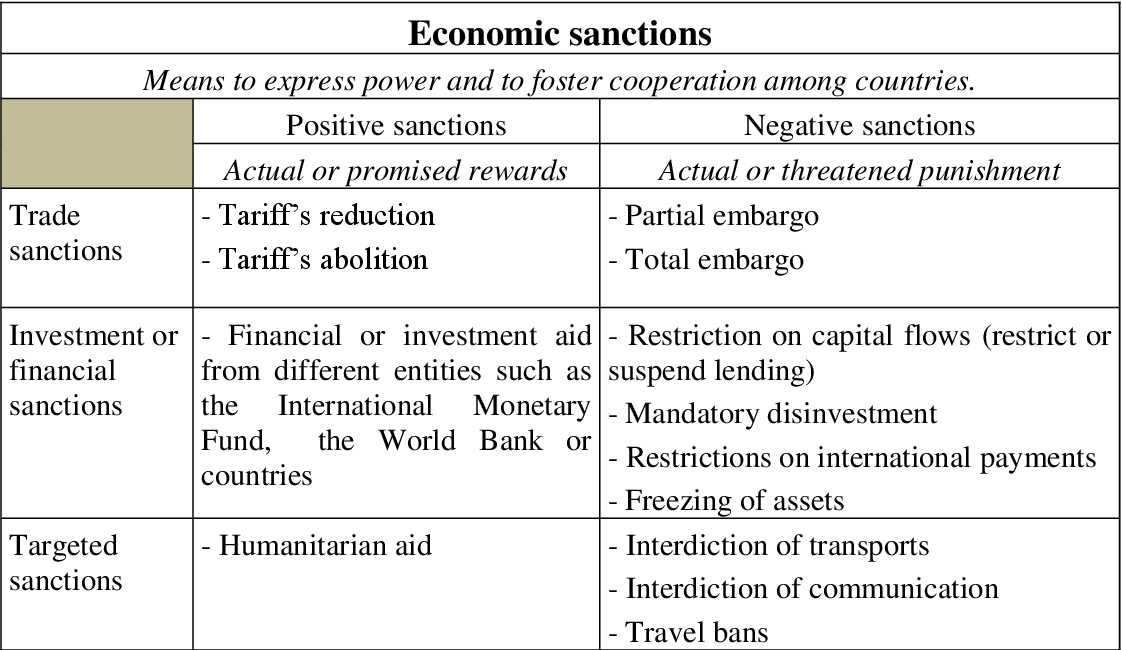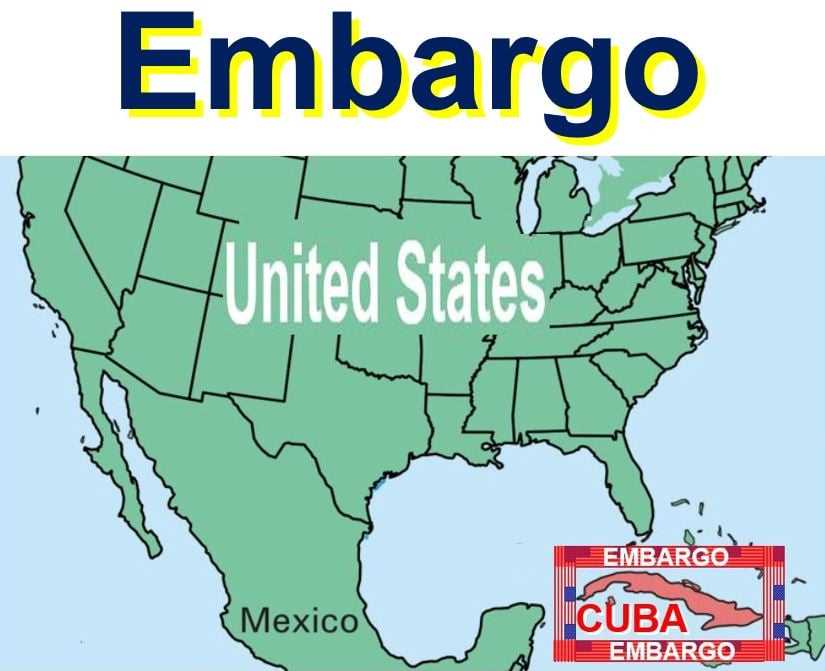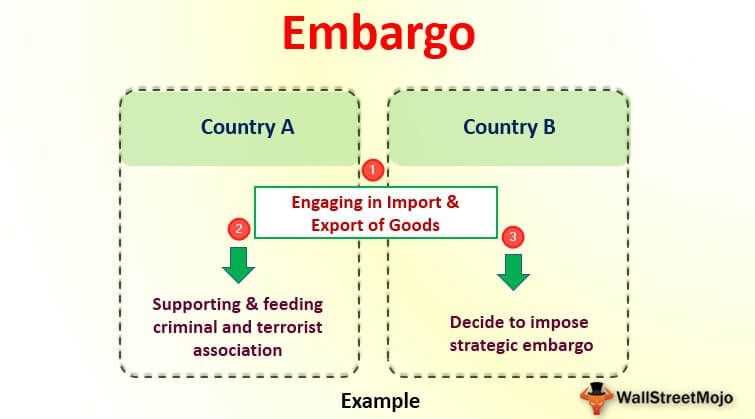What is an Embargo?
An embargo is a government-imposed restriction or prohibition on trade or economic activity with a particular country or group of countries. It is a political tool used by governments to exert pressure on other nations and influence their behavior.
Definition and Explanation
An embargo is a policy measure that restricts or bans trade, investment, or other economic activities with a targeted country or countries. It can be imposed for various reasons, such as national security concerns, human rights violations, or to address geopolitical conflicts. Embargoes can be imposed unilaterally by a single country or multilaterally by a group of countries or international organizations.
Embargoes can take different forms, including trade restrictions, financial sanctions, arms embargoes, travel bans, and diplomatic isolation. They can target specific industries, goods, or services, or they can be comprehensive, affecting all economic sectors. The duration of an embargo can vary, ranging from a temporary measure to a long-term policy.
Examples of Embargoes
There have been several notable examples of embargoes throughout history. One of the most well-known embargoes is the United States embargo on Cuba, which has been in place since 1960. The embargo restricts trade and economic activities between the two countries and has had significant economic and political implications for both nations.
Another example is the United Nations Security Council embargo on Iraq, which was imposed in 1990 after Iraq’s invasion of Kuwait. The embargo aimed to prevent Iraq from obtaining weapons and military equipment and lasted until 2003 when it was lifted after the U.S.-led invasion of Iraq.
Effects of Embargoes
Embargoes can have significant economic, political, and social effects on both the targeted country and the imposing country. In the targeted country, embargoes can lead to economic decline, unemployment, and shortages of essential goods and services. They can also impact diplomatic relations and isolate the country from the international community.
On the imposing country’s side, embargoes can be used as a tool to exert political pressure and achieve specific policy objectives. They can also protect domestic industries and promote national security interests. However, embargoes can also have negative consequences for the imposing country, such as loss of export markets and strained diplomatic relations with other nations.
| Pros | Cons |
|---|---|
| Exert political pressure | Loss of export markets |
| Protect domestic industries | Strained diplomatic relations |
| Promote national security interests |
Definition and Explanation

An embargo is a government-imposed restriction on trade or economic activity with a specific country or group of countries. It is a political tool used to exert pressure or punish a country for various reasons, such as human rights abuses, nuclear proliferation, or aggression towards other nations.
An embargo can take various forms, including a complete ban on imports and exports, restrictions on specific goods or services, or financial sanctions. The goal of an embargo is to isolate the targeted country economically and diplomatically, forcing it to change its behavior or policies.
Embargoes are typically implemented through legislation or executive orders, and they can be imposed unilaterally by a single country or multilaterally by a group of countries or international organizations. The United Nations, for example, has imposed embargoes on countries like North Korea and Iran.
Embargoes can have significant economic and political consequences. On the economic front, they can disrupt supply chains, reduce trade volumes, and harm businesses that rely on international markets. They can also lead to inflation, shortages of essential goods, and higher prices for consumers.
Politically, embargoes can strain diplomatic relations, escalate tensions between countries, and even lead to military conflicts in extreme cases. They can also have unintended consequences, such as strengthening the targeted country’s resolve or pushing it closer to other countries that are not subject to the embargo.
Overall, embargoes are a complex and controversial tool of international relations. While they can be effective in achieving certain objectives, they also have significant costs and potential unintended consequences. Therefore, they are often subject to debate and scrutiny, with proponents arguing for their necessity and effectiveness, and critics questioning their morality and efficacy.
Examples of Embargoes

Embargoes have been used throughout history as a tool for governments to exert political and economic pressure on other countries. Here are some notable examples of embargoes:
1. United States Embargo on Cuba:
One of the most well-known and long-standing embargoes is the United States embargo on Cuba. This embargo was imposed in 1960 and has been in effect ever since. It prohibits most trade and economic transactions between the two countries, with the aim of pressuring the Cuban government to adopt democratic reforms.
2. United Nations Embargo on Iraq:
In response to Iraq’s invasion of Kuwait in 1990, the United Nations imposed an embargo on Iraq. This embargo aimed to limit Iraq’s ability to acquire weapons and military equipment. It also restricted trade and financial transactions with Iraq, with the goal of forcing Saddam Hussein’s regime to withdraw from Kuwait.
3. European Union Embargo on Zimbabwe:
In 2002, the European Union imposed an embargo on Zimbabwe in response to human rights abuses and political violence in the country. This embargo included an arms embargo, travel bans, and asset freezes on individuals and entities involved in the repression of political opposition. The embargo aimed to pressure the Zimbabwean government to respect human rights and promote democratic reforms.
4. United Nations Embargo on North Korea:
Since 2006, the United Nations has imposed a series of embargoes on North Korea in response to its nuclear weapons program. These embargoes include restrictions on trade in weapons, luxury goods, and certain commodities. The goal is to prevent North Korea from further developing its nuclear capabilities and to encourage it to engage in diplomatic negotiations.
5. European Union Embargo on Russia:
In 2014, following Russia’s annexation of Crimea, the European Union imposed an embargo on Russia. This embargo includes restrictions on trade in certain sectors, such as energy, defense, and finance. It also includes travel bans and asset freezes on individuals and entities involved in the annexation of Crimea and the destabilization of Ukraine. The embargo aims to put pressure on Russia to respect Ukraine’s territorial integrity and to find a peaceful resolution to the conflict.
These examples illustrate the diverse range of reasons and objectives behind the imposition of embargoes. Whether it is to promote human rights, prevent the proliferation of weapons, or address geopolitical conflicts, embargoes have proven to be a powerful tool in international relations.
Effects of Embargoes

Embargoes can have significant effects on both the countries imposing them and the countries being targeted. These effects can be economic, political, and social in nature.
Economic Effects
One of the primary effects of an embargo is the disruption of trade between the countries involved. The targeted country may lose access to important markets, resulting in a decline in exports and a decrease in revenue. This can lead to a decrease in economic growth and development.
On the other hand, the country imposing the embargo may also suffer economic consequences. Trade restrictions can limit access to important resources or markets, affecting domestic industries and consumers. Additionally, the imposition of embargoes can strain diplomatic and economic relations with other countries, leading to further economic isolation.
Political Effects
Embargoes can have significant political implications. They can be used as a tool to exert political pressure on a targeted country, forcing them to change their policies or behavior. Embargoes can also be used as a form of punishment for countries that violate international norms or engage in activities deemed unacceptable by the international community.
However, embargoes can also have unintended political consequences. They can strengthen the resolve of the targeted country and rally domestic support behind the government. In some cases, embargoes can even lead to increased nationalism and anti-foreign sentiment.
Social Effects
Embargoes can have social effects on the populations of both the targeted country and the country imposing the embargo. In the targeted country, the embargo can lead to a decrease in living standards, as access to essential goods and services may be limited. This can result in increased poverty and inequality.
Additionally, embargoes can strain social relations between countries and contribute to a sense of mistrust and hostility. They can also hinder cultural exchange and cooperation, as people from the targeted country may face difficulties in traveling or participating in international events.

Emily Bibb simplifies finance through bestselling books and articles, bridging complex concepts for everyday understanding. Engaging audiences via social media, she shares insights for financial success. Active in seminars and philanthropy, Bibb aims to create a more financially informed society, driven by her passion for empowering others.
